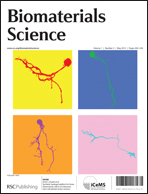
IET Nanobiotechnology
Scope & Guideline
Advancing the Frontiers of Nanobiotechnology.
Introduction
Aims and Scopes
- Nanomaterials for Drug Delivery:
Research on various nanomaterials, such as liposomes, nanoparticles, and nanocarriers, designed for targeted and efficient drug delivery in cancer therapy and other medical applications. - Biowaste Valorization and Green Synthesis:
Exploration of environmentally friendly practices for synthesizing nanomaterials from biowaste, emphasizing sustainability and the utilization of natural resources. - Biomedical Applications of Nanotechnology:
Investigation into the use of nanotechnology for diagnostic, therapeutic, and regenerative medicine applications, including cancer treatment, wound healing, and tissue engineering. - Nanobiotechnology in Agriculture:
Application of nanotechnology in agriculture for enhancing plant growth, pest control, and improving crop resilience against environmental stresses. - Antimicrobial Nanomaterials:
Development of nanomaterials with antibacterial properties for use in food safety, medical devices, and coatings to prevent infections. - Nanotechnology in Environmental Applications:
Research on the use of nanotechnology for environmental remediation, including the removal of pollutants and heavy metals from water.
Trending and Emerging
- Nanoparticle-Based Cancer Therapies:
There is a significant increase in research focused on the use of nanoparticles for targeted cancer therapies, including drug delivery systems and radiosensitization techniques. - Biomimetic Approaches in Nanotechnology:
Emerging studies are increasingly adopting biomimetic strategies for the design of nanocarriers and delivery systems that mimic biological processes, enhancing efficacy and biocompatibility. - Integration of AI and Nanotechnology:
The intersection of artificial intelligence (AI) and nanotechnology is becoming a hot topic, with researchers exploring AI-driven methods for optimizing the design and application of nanomaterials. - Nanotechnology in Regenerative Medicine:
A noticeable trend is the application of nanotechnology in regenerative medicine, particularly in tissue engineering and stem cell therapies, indicating a shift towards more complex biological applications. - Sustainable Nanotechnology Practices:
Research is increasingly focusing on sustainable practices in nanotechnology, including the use of biodegradable materials and the environmental impact of nanomaterials, reflecting global sustainability goals.
Declining or Waning
- Traditional Chemical Synthesis Methods:
There has been a noticeable decline in the publication of papers focusing on traditional chemical synthesis methods for nanoparticles, as the field shifts towards greener, more sustainable synthesis approaches. - Basic Nanomaterials Characterization:
Research solely focused on the basic characterization of nanomaterials without application-based studies appears to be diminishing, as there is a growing emphasis on functional and applied nanotechnology. - Generalized Nanotoxicity Studies:
While nanotoxicity remains an important area, the focus on generalized studies without specific applications or mechanisms is waning, with researchers now aiming for targeted investigations related to specific nanomaterials and their interactions. - Single-Use Nanomaterials:
Research on single-use nanomaterials, particularly those with limited biodegradability, is declining as sustainability and recyclability become more critical in nanobiotechnology.
Similar Journals

Biomaterials Science
Transforming ideas into impactful biomaterials for tomorrow's challenges.Biomaterials Science is a premier journal published by the Royal Society of Chemistry that serves as a leading platform for researchers and professionals in the fields of Biomedical Engineering and Materials Science. With an impressive impact factor bolstered by its Q1 quartile ranking in both disciplines, this journal has positioned itself at the forefront of cutting-edge research, showcasing innovative materials and applications that drive advancements in healthcare and technology. Since its inception in 2013, Biomaterials Science has been committed to disseminating high-quality, peer-reviewed articles that promote scientific knowledge and collaboration among academia and industry. With a global readership and a focus on open access, researchers are encouraged to share their findings to facilitate the development of transformative biomaterials and their applications. Join a vibrant community of scholars as we explore the future of biomaterials through this esteemed publication, enhancing both scientific inquiry and practical application.

JOURNAL OF MATERIALS SCIENCE-MATERIALS IN MEDICINE
Advancing Biomedical Innovation through Materials ScienceJOURNAL OF MATERIALS SCIENCE-MATERIALS IN MEDICINE is a leading peer-reviewed journal published by Springer, dedicated to advancing the field of biomedical materials science. With an ISSN of 0957-4530 and E-ISSN 1573-4838, this Open Access journal has been committed to providing researchers and professionals with freely accessible, high-quality research since 2021. It features an extensive scope spanning bioengineering, biomaterials, biomedical engineering, and biophysics, reflecting its significant impact within these interdisciplinary domains. Recognized within the Q2 category of the 2023 rankings in multiple fields, the journal proudly positions itself as a crucial resource for innovative materials that contribute to advancements in medical applications. With impressive Scopus rankings, including 26th in Biophysics and 40th in Materials Science for Biomaterials, researchers, students, and industry professionals alike can rely on this publication for cutting-edge insights that drive the future of medical materials and technologies. Based in Dordrecht, Netherlands, the journal provides a vibrant platform for sharing groundbreaking discoveries and fostering collaborative research among a global audience.

Nano Materials Science
Driving Breakthroughs in Nanotechnology and Chemical Engineering.Nano Materials Science is a premier open-access journal dedicated to the dissemination of groundbreaking research in the fields of nanotechnology, materials science, and chemical engineering. Published by KEAI PUBLISHING LTD, this journal has quickly established itself as a leading platform in its area since its inception in 2019, with impressive rankings in the Scopus database, holding a Q1 position across multiple categories, including Chemical Engineering and Materials Science. Based in Beijing, China, Nano Materials Science provides researchers and practitioners access to a wealth of high-quality peer-reviewed articles, fostering innovation and collaboration within the scientific community. With its impact factor steadily rising and a commitment to open access, the journal aims to bridge the gap between theoretical research and practical applications, making it an essential resource for professionals and students eager to stay at the forefront of materials research and nanotechnology advancements.

JOURNAL OF NANOBIOTECHNOLOGY
Exploring the Frontiers of Nanoscience and BiotechnologyJOURNAL OF NANOBIOTECHNOLOGY is a distinguished academic journal published by BMC in the field of nanobiotechnology, focusing on the intersection of nanoscience, biotechnology, and biomedical engineering. Since its inception in 2003, this open-access journal has played a pivotal role in disseminating high-quality research, becoming a leading platform for innovators and scholars alike. With a remarkable impact factor and consistently ranking in the Q1 category across multiple fields—including Applied Microbiology, Bioengineering, and Pharmaceutical Science—the journal demonstrates its critical relevance and influence in advancing knowledge and applications in nanobiotechnology. Furthermore, its impressive Scopus rankings reflect its commitment to rigorously peer-reviewed content, making it a go-to resource for researchers, professionals, and students striving to push the boundaries of science. Given its broad scope, covering emerging trends and technologies, JOURNAL OF NANOBIOTECHNOLOGY continues to foster collaboration and innovation across multidisciplinary fields, inviting submissions from across the globe.

BME Frontiers
Innovating at the Intersection of Science and MedicineBME Frontiers, published by the American Association for the Advancement of Science, is an innovative open-access journal dedicated to the burgeoning field of Biomedical Engineering. Since its establishment in 2020, this journal has aimed to bridge the gap between cutting-edge research and practical application, promoting advancements in biomedical technologies, medical devices, and healthcare solutions. Boasting impressive rankings within Scopus—64th among 398 in Medicine (miscellaneous) and 81st among 303 in Biomedical Engineering—BME Frontiers stands out as a significant contributor to scholarly communication, offering rich insights for researchers, professionals, and students alike. With consistent publication projected through 2024, the journal serves as an essential platform for disseminating high-quality research that can drive innovation and inspire new approaches in the healthcare sector.

Progress in Biomedical Engineering
Empowering research that shapes the future of healthcare.Progress in Biomedical Engineering, published by IOP Publishing Ltd, is a premier open-access journal that serves as a vital platform for the dissemination of innovative research in the field of biomedical engineering. With an impressive Q1 classification in the Biomedical Engineering category for 2023, this journal has established itself as a significant contributor to the advancement of engineering solutions that improve healthcare outcomes. Recognized for its high-quality and impactful publications, it ranks 51st out of 303 in its field on Scopus, placing it in the 83rd percentile. The journal aims to foster interdisciplinary collaboration and introduce pioneering methodologies and technologies that bridge the gap between engineering and medicine. By providing a pathway for rapid communication of fundamental and applied research, Progress in Biomedical Engineering is dedicated to shaping the future of healthcare technology. Access to its content ensures that researchers, professionals, and students remain at the forefront of biomedical innovation.

Nanobiotechnology Reports
Unveiling innovations at the nanoscale.Nanobiotechnology Reports, an impactful journal published by PLEIADES PUBLISHING INC, serves as a prominent platform for disseminating cutting-edge research at the intersection of nanotechnology and biotechnology. With its ISSN 2635-1676 and E-ISSN 2635-1684, this open-access journal is committed to providing researchers, professionals, and students with accessible knowledge and innovations that drive advancements in this rapidly evolving field. Operating out of the United States, Nanobiotechnology Reports has established itself in various engineering and science categories, including Bioengineering and Biomedical Engineering, currently holding a Q4 quartile ranking in 2023. Although it is in the early stages of its publication journey since its convergence in 2021, the journal aims to foster collaboration and knowledge-sharing within the scientific community, addressing the complexities of nanomaterials and their applications in biological systems. Researchers and practitioners in nanobiotechnology are encouraged to contribute to this expanding body of knowledge, facilitating the development of innovative solutions that impact various sectors, from healthcare to electronics.

Nano Convergence
Fostering innovation through the convergence of disciplines.Nano Convergence is a premier open access journal dedicated to the rapidly evolving fields of nanotechnology, materials science, and engineering. Published by SPRINGER, this journal has been at the forefront of interdisciplinary research since its inception in 2014, and is set to continue its journey until 2024. With an impressive impact factor and recognition as Q1 in both Engineering (miscellaneous) and Materials Science (miscellaneous) categories, Nano Convergence ranks among the top publications, listed as Rank #8 out of 307 in General Engineering and Rank #34 out of 463 in General Materials Science according to Scopus metrics. This journal provides a platform for researchers, professionals, and students to share pioneering studies that converge different disciplines within nanotechnology. With its commitment to open access, Nano Convergence ensures that cutting-edge research is readily available to the global community, fostering innovation and collaborative advancements in the field.

BioChip Journal
Advancing Biochip Innovations for a Healthier TomorrowBioChip Journal, published by the Korean Biochip Society (KBCS), is a renowned academic platform dedicated to advancing the fields of bioengineering, biomedical engineering, biotechnology, and electrical and electronic engineering. With its ISSN 1976-0280 and E-ISSN 2092-7843, this esteemed journal has established itself as a valuable resource for researchers, professionals, and students alike, providing them with cutting-edge research and insights since its inception in 2008. The journal has earned a commendable standing in the academic community, achieving Q2 ranking across key categories, thereby placing it amongst the top-tier publications. With its impressive Scopus rankings, including a top 10% position in Electrical and Electronic Engineering and a strong showing in both Biomedical Engineering and Biotechnology, BioChip Journal plays a vital role in disseminating innovative biochip technologies and applications. The journal continues to invite groundbreaking studies and reviews that promote the interdisciplinary collaboration essential for the future of biochip research, ultimately contributing to advancements in healthcare, diagnostics, and therapeutics.

Biomaterials Research
Leading the charge in materials innovation.Biomaterials Research, published by the American Association for the Advancement of Science, is a prominent open access journal established in 2014, dedicated to advancing the field of biomaterials. Based in the United Kingdom, this journal has swiftly become an essential platform for researchers and practitioners, offering groundbreaking insights in biomaterials, biomedical engineering, ceramics and composites, and miscellaneous medical fields. With its impressive Q1 ranking across multiple relevant categories in 2023 and its strong Scopus rankings, including a remarkable 90th percentile in the medicine category, Biomaterials Research showcases high-quality, peer-reviewed research designed to address both practical and theoretical challenges in biomaterials science. As an open access journal, it promotes wider dissemination and accessibility of research findings, crucial for fostering innovation and collaboration within the scientific community. Researchers, professionals, and students alike are encouraged to contribute, read, and engage with the latest developments in this dynamic field.